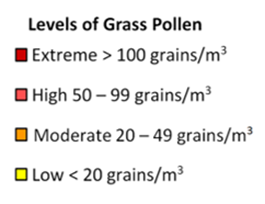POLLEN COUNTS AVAILABLE FOR PEOPLE WITH ASTHMA AND ALLERGIES
Asthma Australia is encouraging millions of people with asthma and hay fever in to keep watch on daily pollen counts with the grass pollen season in full swing.
Across Australia five million people are estimated get hay fever resulting in sneezing, red itchy eyes, and inflamed sinuses, with many also at risk of experiencing breathing difficulty caused by asthma.
To help reduce the impact of asthma and hay fever, Asthma Australia CEO Michele Goldman said daily pollen counts and thunderstorm asthma alerts were vital – and potentially lifesaving – services.
“Australia is one of the most allergic countries in the world and we have extremely high rates of asthma. These conditions are linked,” Ms Goldman said.
“The pollen counts are available each day for major centres during pollen season. For south-east areas, this includes thunderstorm asthma risk.
“If you’re sensitive to pollens with asthma or allergies, then avoid high and extreme pollen days by staying in,” she said.
To treat asthma and hay fever, a wide range of reliever and preventive treatments are available, and these should be prescribed by a doctor and/or informed by a pharmacist.
People are encouraged to view pollen counts on the Asthma Australia website at: asthma.org.au/pollen-monitoring.
The Thunderstorm Asthma Alert service is available via the Victorian Department of Health and Human Services’ Epidemic thunderstorm asthma risk forecast or via the Melbourne Pollen App.
Daily pollen counts are reported based on a low to extreme scale alongside health advice, as follows:

Low:
- Continue as planned with normal asthma and hay fever preventative action.
Medium - be cautious:
- Avoid exposure where possible
- Always keep asthma reliever medication with you; ensure you are treating hay fever symptoms.
High – be on alert:
- Avoid exposure wherever possible
- Avoid outdoor exercise
- Consider changing plans if they involve being outdoors
- Always keep asthma reliever medication with you
- Ensure you are treating hay fever symptoms
- Close windows in the car and doors and windows at home to reduce pollen exposure.
Extreme – be vigilant:
- Avoid exposure by staying indoors with windows and doors closed
- Avoid outdoor exercise
- Always keep asthma reliever medication with you
- Ensure you are treating hay fever symptoms
- Always follow your asthma action plan – call triple zero in case of an emergency
- Turn air conditioning to recycle air, if available.
If you experience symptoms of cough, breathlessness, tight chest or wheeze during the grass pollen season you should put your asthma management plan into action and seek medical help if needed.
For more information about managing spring allergies and asthma, speak to an Asthma Educator by calling 1800 ASTHMA (1800 278 462) or visit asthma.org.au/spring-asthma.





 1800 278 462
1800 278 462


